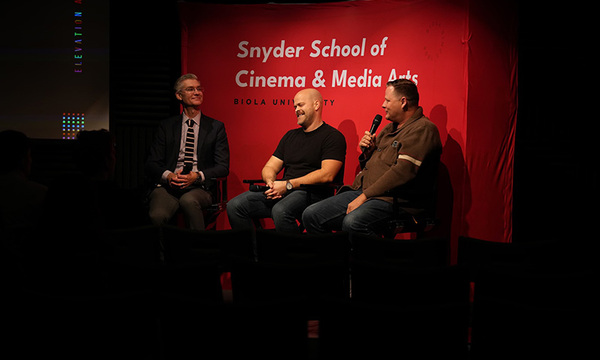Biola University launches a new master’s program in speech-language pathology (M.S.) with first cohort of 22 students. The new program launched this fall upon receiving candidacy of accreditation by the Council on Academic Accreditation in Audiology and Speech-Language Pathology (CAA). Candidacy is a pre-accreditation status that is held for five years while a new master's level program demonstrates its ability to maintain high standards necessary for full accreditation.
“A master's degree in speech-language pathology at Biola is unique because Biola's program will be one of very few programs that teach master's level speech pathology from a biblical perspective,” said Tonya Dantuma, associate professor of communication sciences and disorders.
Dantuma is excited to work with the incoming class alongside fellow faculty members such as department chair Matthew Rouse who worked to develop this new program.
In August, Biola's first cohort of 22 students began the two-year, 63-unit master's in speech-language pathology degree. These students will complete rigorous academic courses and 400 hours of supervised clinical experiences which will qualify them to become fully licensed speech-language pathologists.
Students who enter the program during its candidacy stage are eligible to sit for the exam necessary to earn a California State Speech Language Pathology (SLP) license, California State SLP services credential and American Speech Language Hearing Association Certification.
The primary reason for Biola’s new graduate program in speech pathology is due to the shortage of credentialed personnel in this particular field.
“Children are feeling the greatest impact of the national shortage of school SLPs because speech-language services are sometimes performed by uncertified personnel or not at all,” stated the Utah State University journal.
Many graduate schools do not have enough space to compensate for interested candidates who want to receive an education in speech pathology. Biola’s new program allows for more students to become educated in a growing field with strong job opportunities as well as abundant chances for graduate students to treat patients.
Biola offers students a unique opportunity to take courses such as a class focused on dysphagia when they are enrolled in the graduate program. The course on dysphagia is an overview of swallowing, both the normal swallow and all the abnormalities that can happen. Students get the chance to learn how to perform different swallow evaluations and how to create treatment plans for patients with swallowing difficulties.
Additional hallmarks of the new program will be strong theoretical framework and excellence in clinical practice taught from a biblical perspective in order to promote an understanding of humankind.
“It is our goal to equip our students to love well the people in their sphere of influence locally and globally as they effectively engage in the issues of our profession through research, publication, clinical work, and service,” said Dantuma.
Biola is accepting student applications for the new program until Feb. 15, 2017. Learn more and apply on Biola University’s website.
Written by Erin Wilson, public relations intern. For more information, contact Jenna Loumagne, media relations specialist, at (562) 777-4061 or jenna.loumagne@biola.edu.
 Biola University
Biola University
_(1).jpg)
